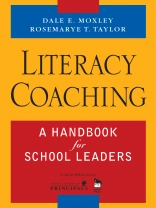Improve student achievement by effectively implementing literacy coaching!
Fail-safe literacy is defined as listening, viewing, thinking, speaking, reading, writing, and expressing through multiple symbol systems at a developmentally appropriate level. An effective literacy coach, who can inspire extraordinary performance from ordinary people, can be a key to improving literacy schoolwide.
Grounded in research and an evidence-based approach, this handbook guides school leaders in successfully implementing literacy coaching, with a systematic process for teachers, administrators, and students. It is designed to improve reading, writing, and content learning through literacy infusion into curricular and instructional practices throughout the school.
Classroom strategies, specific teacher leadership practices, and resources used successfully in schools are showcased throughout, along with
- Background knowledge and an introduction to ‘fail-safe’ literacy
- Details on the roles and responsibilities of literacy coaches
- Ideas for building the literacy team
- Ways to study data and monitor achievement
- Practical guidance for the literacy coach′s continuing success
Literacy Coaching supports school leaders in implementing a successful literacy coaching program, and in creating a collaborative professional learning community for literacy, resulting in improved student achievement.
Tabela de Conteúdo
Preface
Acknowledgments
About the Authors
1. Fail-Safe Literacy Coaching
2. Literacy Coaching: Working Together and Learning Together
3. Preparing to Be a Literacy Coach
4. Getting Ready to Provide Literacy Coaching Service
5. Building the Literacy Team
6. Monitoring and Communicating Data on Student Achievement
7. Supporting Intensive Intervention
8. Delivering Meaningful Professional Development
9. Managing Challenges
References
Index
Sobre o autor
Rosemarye (Rose) Taylor has a rich background that includes middle and high teaching, school administration, and district administration. She was a reading, language arts, and Spanish teacher, and counselor, followed by service as a middle and high school administrator, and district level administrator in Georgia and Florida, USA. In private sector management she was Director of Professional Development for Scholastic, Inc., New York. Currently, she is Associate Professor of Educational Leadership at the University of Central Florida in Orlando. As Associate Professor of Educational Leadership at the University of Central Florida, her specialty is systematic leadership to improve student achievement Pk-20, which as lead to her interest and research in the professional practice doctorate. She has conducted research on leadership and change, particularly as it relates to accountability. Presentations on this topic have been given at University Council of Educational Administration, American Association of Educational Research, American Association of School Administrators, International Reading Association, Association for Supervision and Curriculum Development, National Association of Secondary School Principals, and National Middle School Association conferences. Her articles have been published in Kappan, Educational Leadership, Middle School Journal, Schools in the Middle, American Secondary Education, AASA Professor, The National Staff Development Journal, Principal Leadership, The School Administrator, Educational Research Service Spectrum, and International Journal of Education Management. Six books including Leading Learning: Improve Student Achievement Today! (2010), Improving Readers, Writers, and Content Learning for Students in Grades 4-12 (2007), Leadership Handbook for Literacy Coaching (2006), The K-12 Literacy Leadership Fieldbook (2005), Literacy Leadership for Grades 5-12, (2003), and Leading With Character to Improve Student Achievement (2003), reflect the commitment to all students learning more through leadership that creates ethical, fail-safe systems. She serves as consultant on literacy, learning communities, curriculum system development, and leadership to schools, districts and professional organizations.











